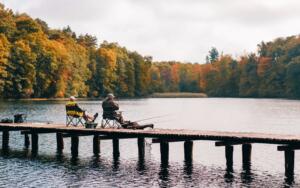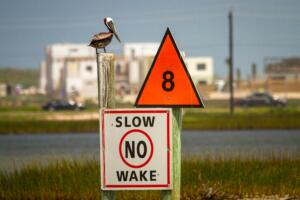If you’re interested in lakefront property, you may be put off by the idea of purchasing real estate on waters that might have boat restrictions.
You shouldn’t let boat restrictions scare you off though, as there are quite a few benefits you can enjoy from living on such a lake.
 Keeps noise levels low
Keeps noise levels low
Some lakes have restrictions on the size of motor that can be used on their waters.
If you live on such a lake, you won’t have to worry about noise levels as much. This is because smaller motors tend to run more quietly. Not only will your time on the lake be more peaceful, but you’ll also be able to enjoy spending time on your own property more since you won’t be disturbed by noisy passing watercraft.
The fact that there is less noise on your restricted lake will make fishing more pleasant as well.
Keeps water conditions safer
A good number of boating accidents could be prevented if the right safety precautions were taken. As such, the requirement to register your boat helps keep you safer while out on the water. So does the requirement to take a boating safety class or have personal flotation devices with you at all times.
You might be surprised to know that nearly half of all boating accidents are related to alcohol use. You are more likely to encounter a drunken boater than you are an intoxicated motorist. Many states have enacted laws to deal with the dangers of drinking and boating, making it just as serious an offense as drinking and driving. The result is that your risk of being injured in a boating accident is greatly reduced.
More boating accidents happen at night than during the day. This is why it is important to have restrictions on nighttime boating. A few of the things that will help make boating safer at night include:
• Having extra patrols on the water
• Requiring boats to have proper illumination as determined by the U.S. Coast Guard
• Speed limitations
No Wake Zones
 No wake zones are typically enacted near fishing docks, piers, marinas, and bridges. This is in order to ensure safe conditions for everyone. If these zones weren’t enforced, it could be difficult to get in and out of your docked boat or might interfere with you fishing from the shore.
No wake zones are typically enacted near fishing docks, piers, marinas, and bridges. This is in order to ensure safe conditions for everyone. If these zones weren’t enforced, it could be difficult to get in and out of your docked boat or might interfere with you fishing from the shore.
Not everyone is courteous enough to avoid making waves, so it’s actually to your benefit to have designated no-wake zones on your lakefront.
No wake zones also serve another purpose in that they protect boaters from dangers associated with flooding. Dangers such as extremely high currents or debris in the water.
Prevents Environmental Damage
Some bodies of water have strict regulations regarding sanitation and pollution control to prevent damage to the environment.
For example, the size and type of engine your boat carries could be regulated to keep exhaust fumes from contaminating the water and polluting the air around your lake. Others will have restrictions on the disposal of waste. This is so water quality is not affected. There might also be restrictions on launching your boat to prevent erosion along the shoreline.
These regulations allow your lake to be a habitat for native fish and wildlife. They are especially important if it is also a source of drinking water for you.
Sometimes Boating Restrictions are What You Want
Rather than be discouraged by boating restrictions, it would help if you considered how they benefit you and other home owners in your area. Most restrictions do not seriously affect your use of the water, and will not be overly burdensome for you to comply.
Don’t let the idea of boating restrictions stop you from realizing your dream of owning lakefront property, as boating restrictions will only enhance your enjoyment of the lake.

